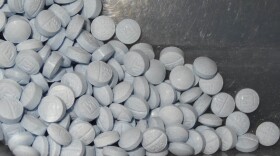-
The decline in Florida mirrors what happened nationwide. The Centers for Disease Control and Prevention reported 30,000 fewer U.S. drug overdose deaths in 2024 than the year before — the largest one-year decline ever recorded.
-
A long construction timeline for an approved behavior health crisis center is the point of contention for Palm Beach County leaders, who demand a quicker turnaround.
-
Settlement from opioid distributors to pay $7.7 million a year toward ‘person-centered, recovery-oriented care’
-
A synthetic opioid called isotonitazene or ISO is far more potent and deadly than fentanyl, and a standard amount of Narcan won't overturn an overdose. Police are finding it pressed into pills, marketed as oxycodone, for instance, here in South Florida.
-
The recommendation on spending nearly $150 million in opioid settlement money over 20 years received a warm — and sympathetic — reaction from the Palm Beach County Commission.
-
As national distributors and pharmacies restricted the flow of painkillers in response to the opioid crisis, Florida’s most popular grocer did the opposite, according to a Tampa Bay Times data analysis.
-
A national movement to get naloxone in schools is gaining momentum, at a time when opioids account for 90% of drug overdose deaths among teenagers, according to the Centers for Disease Control and Prevention.
-
Aaron Broussard was sentenced to life in prison for 11 deaths that were tied to controlled substances he sold. Those who died thought they were taking Adderall, but they actually ingested fentanyl.
-
The plan is for health departments in all 67 counties to have kits with two Narcan nasal sprays that can be administered without a health care provider.
-
Families in Palm Beach County hoped protesting would convince Sheriff Ric Bradshaw to equip his deputies with Narcan. Their pleas haven't worked — until now.
-
Walgreens was the 12th and final defendant in the state's legal battle against opioid manufacturers, distributors and pharmaceutical companies it holds responsible for the epidemic.
-
Attorney General Ashley Moody issued an emergency rule to outlaw eight synthetic drugs known as nitazenes. The order said the drugs are commonly available online and through illicit drug markets.
Play Live Radio
Next Up:
0:00
0:00
Available On Air Stations











